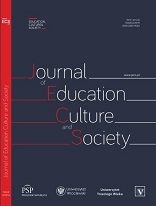THE RELATIONSHIP BETWEEN TURKISH EFL STATE SCHOOL TEACHERS' CULTURAL INTELLIGENCE AND THEIR PROFESSIONAL WELL-BEING
THE RELATIONSHIP BETWEEN TURKISH EFL STATE SCHOOL TEACHERS' CULTURAL INTELLIGENCE AND THEIR PROFESSIONAL WELL-BEING
Author(s): Efe Efeoğlu, Ömer UlumSubject(s): Social Sciences, Education, Educational Psychology, Sociology of Education
Published by: Fundacja Pro Scientia Publica
Keywords: EFL Teachers;Cultural Intelligence;Professional Well-being;ELT Departments
Summary/Abstract: Cultural intelligence is described as the ability of a person to behave adequately in culturally diverse environments. It involves comprehending the effects of cultural background on the attitudes of people for auspicious participation in any social setting. Cultural intelligence may be positively and significantly correlated with professional well-being among English as foreign language (EFL) teachers. So, the present study sought to investigate the correlation between Turkish EFL state school teachers' cultural intelligence and their professional well-being. A sample including 120 EFL state school teachers completed two questionnaires: (1) Cultural Intelligence Scale developed by Cultural Intelligence Center (2005); and (2) the Scale of Teacher Perception of Professional Well-Being developed by Yildirim, Arastaman and Dasci (2016). The results of the study indicated significant correlations between Turkish EFL state school teachers' cultural intelligence and their professional well-being. This study may help English Language Teaching (ELT) departments to implement materials to their curriculum for aiding EFL teachers in terms of developing cultural intelligence. Furthermore, this paper makes a unique contribution to the area of cultural intelligence by identifying whether there is a relationship between cultural intelligence and professional well-being.
Journal: The Journal of Education, Culture, and Society
- Issue Year: 8/2017
- Issue No: 2
- Page Range: 228-239
- Page Count: 12
- Language: English

